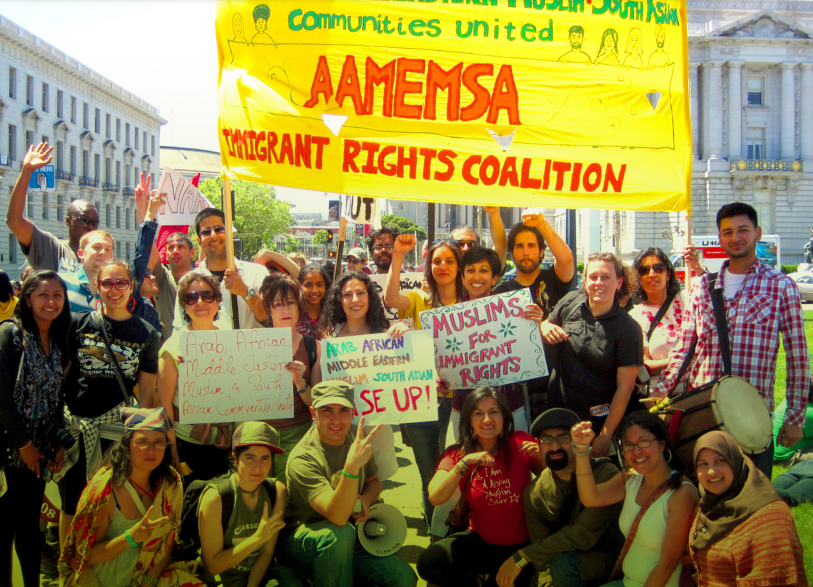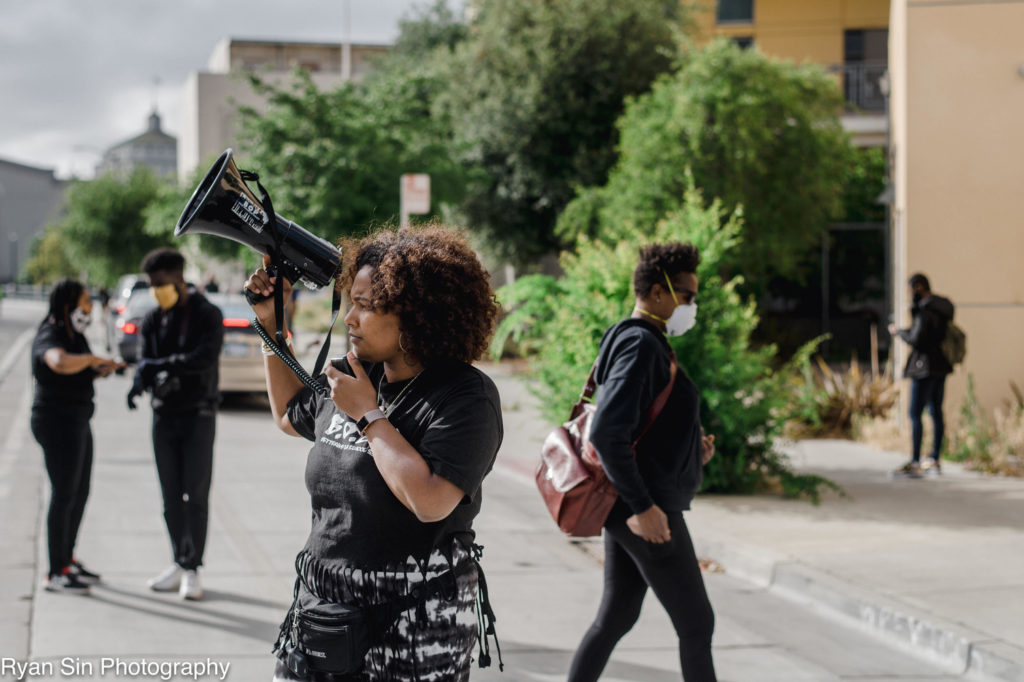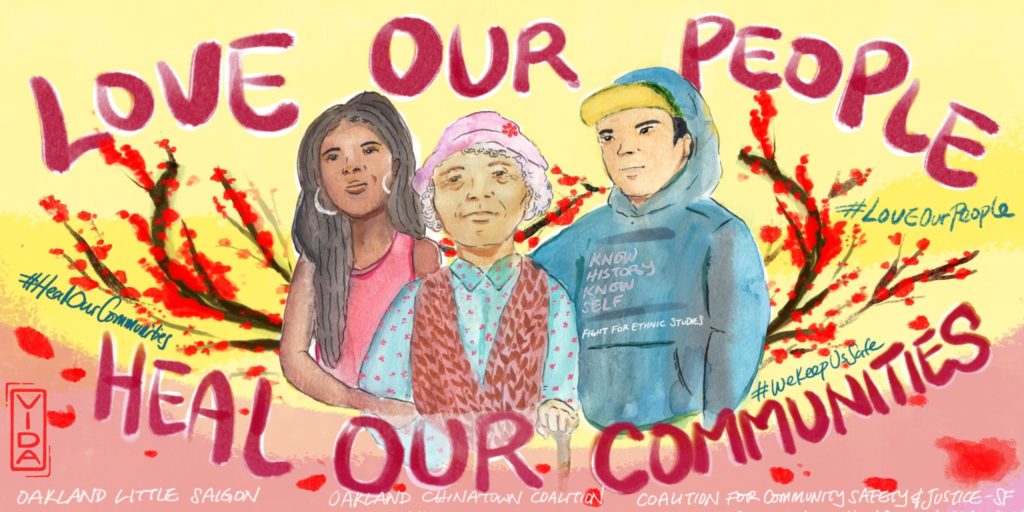Every moment is an organizing opportunity, every person a potential activist, every minute a chance to change the world.
Dolores Huerta, co-founder, United Farm Workers
The Power of Organizing
As COVID-19 began to surge in the Bay Area and nationwide in 2020, so did anti-Asian violence, including horrific crimes against Asian American and Pacific Islander elders. The Asian Pacific Environmental Network (APEN), a longtime SFF grantee, knew it couldn’t go it alone, and the support it offered needed to be cross-cultural in order to unite rather than divide communities during this terrifying time. “We needed to make sure our communities had a good sense of what was going on, especially with so much misinformation out there,” Alvina Wong, APEN campaign organizing director told us in 2021.
APEN quickly turned to a coalition of community organizations, all SFF grantees, including Community United for Restorative Youth Justice, Oakland Trybe, the Oakland Vietnamese Chamber of Commerce, AYPAL, the Anti-Police Terror Project and Community Ready Corps. Together, they helped organize community trainings, hold two large solidarity vigils in Oakland and San Francisco, and expand volunteer-led foot patrols in Oakland Chinatown, which offered an alternative to traditional policing.
This type of intersectional community organizing is one of many examples of SFF’s history of supporting power building as the underpinning of strong, self-determined communities and an inclusive democracy. It’s also emblematic of our Power work—one of three pathways that help define the People, Place and Power racial equity agenda we introduced in 2016. “To get to change, we need people to be able to participate; we need people to be able to bring their voices to the different kinds of debates, to the different kinds of discussions that are happening,” said SFF’s Chief Impact Officer Judith Bell in 2016. “We need to focus on building power so we can achieve the changes we need.”
Supporting Community Anchors and Civil Rights
Did you know?
SFF co-founder Daniel E. Koshland Sr. was a founding board member of San Francisco-based civil rights organization the Council for Civic Unity. The council worked toward “uniting leaders of the city’s several minority groups,” as the organization described itself in a letter to W.E.B. DuBois in 1948. SFF began funding the council in 1957.
During our earliest years, SFF invested in spaces where Bay Area residents could gather and build community. Examples of this work included grants in the 1950s to San Francisco’s Booker T. Washington Community Center, the Visitacion Valley Community Center and the Telegraph Hill Neighborhood Association. In the 1960s, we began supporting pivotal civil rights organizations including the Urban League, a civil rights and economic empowerment organization and one of the first in the country to focus on the rights of Black Americans. In 1952, the San Francisco Urban League, together with the San Francisco NAACP, the Council for Civic Unity (all SFF grantees at the time) and other organizations, lobbied San Francisco Mayor Elmer Robinson to fight discrimination in the city’s housing.
As the civil rights movement gained momentum in the 1960s, many Bay Area donors turned to SFF, knowing that we were deeply connected to local leaders in the Bay Area’s own civil rights struggle. By 1966, we were highlighting our work to “ease social inequities” and “the culturally underprivileged” through our grants to the Urban League, Council for Civic Unity and Big Brothers.
In the 1970s, SFF expanded our civil rights, community organizing and direct services work by providing early funding for the Center for Independent Living (now known as the CIL) in Berkeley. Led by its founder Ed Roberts, the CIL played a key advocacy role in the modern disability rights movement. During this era, SFF also supported a group of new Asian American organizations at a time when a pan-Asian American identity and movement was just starting to take shape. “I hope that the San Francisco Foundation has a sense of how important its seed-funding grants are for community organizations,” says Don Tamaki, former executive director of the Asian Law Caucus. “Simply put, but for those grants, the ALC would not be in existence today.”
Civic Engagement and Immigrant Inclusion
Voting is one of the cornerstones of our democracy, and SFF’s efforts have focused for decades on including communities that systems have intentionally excluded from the democratic process. Much of the groundwork for this was laid during CEO Sandra Hernández’s tenure with Vice President of Programs James Head. “The two of them have deep commitment and roots and were very active around systemic change,” says Tessa Rouverol Callejo, who joined SFF in 1996 and most recently served as senior program officer with the Power Pathway until 2022. “They understood the importance of building power, building community engagement and supporting leadership.”
Key to this work has always been the inclusion and engagement of immigrant communities in the Bay Area, which systems and society have too often excluded from the democratic process and the chance to thrive. In 1986, the federal Immigration Reform and Control Act (IRCA) was signed into law, ushering in the opportunity for undocumented immigrants who came to the United States prior to 1982 to gain full legal status. SFF, in partnership with Northern California Grantmakers and other funders, immediately set up a task force to support frontline organizations to ensure that immigrants in the Bay Area had access to immigrant legal services and information on the legalization process.

During a surge in anti-immigrant sentiment in California, voters passed Proposition 187, stripping public benefits from undocumented immigrants. The main aspects of the law were ruled unconstitutional, such as an attempt to exclude undocumented immigrant children from the state’s public schools. Despite significant efforts to overturn Proposition 187, several aspects of the law remained in effect for 20 years and it contributed to heightening anti-immigrant sentiments in the state and country. Our work to oppose the measure helped create the Interfaith Movement for Human Integrity (formerly known as the Interfaith Coalition for Immigrant Rights), which continues to be a major force in immigrant and criminal justice today.
After the Sept. 11 attacks in 2001, SFF teamed up with Asian Americans and Pacific Islanders in Philanthropy (AAPIP) to support Arab, Middle Eastern, Muslim and South Asian (AMEMSA) Americans who faced a surge of attacks from the U.S. government and xenophobic citizens. The work took shape in the form of the AMEMSA Civic Engagement Fund, which between 2006 and 2014 helped organize and build power among AMEMSA communities, and the One Nation Bay Area Project, which we supported with AAPIP, the Silicon Valley Community Foundation and the Marin Community Foundation to increase understanding between American Muslims and non-Muslims during the height of post-9/11 Islamophobia. This coordinated philanthropic response to a community emergency later helped inform our response to the election of President Donald Trump and subsequent attacks on immigrant communities.
Deepening Our Commitment to Power Building
Did you know?
In June 2020, less than a month after the murder of George Floyd, SFF grantee Black Organizing Project helped eliminate police from the Oakland Unified School District. The victory, which helps create a safe learning environment for students, and students of color in particular, is part of a national movement to end policing in our nation’s schools.
Before SFF organized our equity agenda in 2016, we held community listening sessions across the Bay Area to learn community priorities and to review and discuss our new People, Place and Power strategies to achieving racial equity in the Bay Area. Initially, our approach was to consider power building a part of all lines of work without naming it as a standalone focus. With input from community leaders doing work on the ground, we determined that power building was in fact critical to our new path forward and needed to be explicitly named in our equity agenda. “When you think about really having the kind of significant impact and systemic change that the equity agenda is about, organizing can’t be secondary,” Callejo says. “It has to be central, undergirding everything.”
After collecting community input during our listening sessions, we worked harder to bring the element of power into focus and developed the goal of the Power Pathway: ensuring residents have a strong political voice and can shape the decisions that affect their lives and communities. This means making sure that every voice is heard and that Bay Area communities that have long been silenced can shape the decisions that affect their lives. It also means supporting an ecosystem of both 501(c)3s and 501(c)4s that are transforming nonpartisan electoral work across the state through the work of organizations such as PICO California, ACCE Institute and California Calls.
Through the Power Pathway, SFF has, since 2016, deepened our support for neighborhood leaders, grassroots organizations, faith leaders, civic leaders and others to build a movement that ensures that all members of the community can have a good job and an affordable home and exercise their political voice.

Looking forward, SFF’s power-building work will continue focusing on supporting community-led efforts for self-determination in the following ways: increasing visibility of leaders; directing more funding toward organizing capacity and grassroots leadership; holding elected leaders accountable to ensure that systems and structures work for communities; and strengthening multiracial and intergenerational organizing networks. “I think about some of the organizations that we have funded in recent years, that I could not have imagined us funding when I first started [at SFF],” Callejo says. “There’s been an evolution of calculating what is real risk, what is courage, what is vision, and what is a willingness to stand with people when you know the worst of systemic racism and exploitation and oppression are being unveiled.”
One person is an activist. A community of activists is power. Since our early days, we have understood that each of us holds power, and together, led by people who are closest to the challenges, we can support solutions that go the distance to create an equitable Bay Area.

